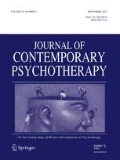Abstract
This paper offers a theoretical and methodological formulation of setbacks in the process of assimilation of problematic experiences in psychotherapy. It is based on a series of theory-building case studies, in which case observations were used to modify and confirm an evolving understanding. Assimilation typically follows a sawtoothed progression in which advances alternate with setbacks. Research has identified two main types of setbacks, called exceeding the therapeutic zone of proximal development, and the balance strategy, which occur under systematically different conditions. Both types of setbacks can be understood as switching strands within a problematic theme. This formulation defines and elaborates the methodological concepts of topic, theme, and strand, as well as the underlying theoretical concepts of internal voices and sub-voices. These are illustrated with examples from a clinical case. This elaboration of the assimilation model is related to other perspectives that emphasize people’s multiplicity of internal voices and used to suggest further studies.


Similar content being viewed by others
References
Caro Gabalda, I. (1996). The linguistic therapy of evaluation: A perspective on language in psychotherapy. Journal of Cognitive Psychotherapy, 10, 83–104.
Caro Gabalda, I., & Stiles, W. B. (2009). Retrocesos no contexto de terapia linguística de avaliaçâo [Setbacks in the context of linguistic therapy of evaluation]. Análise Psicologica, 2(XXVII), 199–212.
Caro Gabalda, I., & Stiles, W. B. (2013). Irregular assimilation progress: Reasons for setbacks in the context of linguistic therapy of evaluation. Psychotherapy Research, 23, 35–53.
Caro Gabalda, I., Stiles, W. B., & Pérez Ruiz, S. (2016). Therapist activities preceding setbacks in the assimilation process. Psychotherapy Research, 26, 653–664.
Georgaca, E. (2003). Exploring signs and voices in the therapeutic space. Theory & Psychology, 13, 541–560.
Goodridge, D., & Hardy, G. E. (2009). Patterns of change in psychotherapy: An investigation of sudden gains in cognitive therapy using the assimilation model. Psychotherapy Research, 19, 114–123.
Hermans, H. J. M. (1996). Voicing the self: From information processing to dialogical interchange. Psychological Bulletin, 119, 31–50.
Hermans, H. J. M. (2001). The dialogical self: Toward a theory of personal and cultural positioning. Culture & Psychology, 7, 243–281.
Hermans, H. J. M., Kempen, H. J. G., & Van Loon, R. P. P. (1992). The dialogical self: Beyond individualism and rationalism. American Psychologist, 47, 23–33.
Knox, S., Goldberg, J. L., Woodhouse, S. S., & Hill, C. E. (1999). Clients’ internal representations of their therapists. Journal of Counseling Psychology, 46, 244–256.
Kramer, U., Meystre, C., Imesch, C., & Kolly, S. (2016). Assimilative processes in a client with borderline personality disorder: Tracking internal multiplicity over the first ten sessions of therapy. Journal of Psychotherapy Integration, 26, 144–159.
Leiman, M., & Stiles, W. B. (2001). Dialogical sequence analysis and the zone of proximal development as conceptual enhancements to the assimilation model: The case of Jan revisited. Psychotherapy Research, 11, 311–330.
Mendes, I., Gomes, P., Rosa, C., Salgado, J., Basto, I., Caro Gabalda, I., & Stiles, W. B. (2016). Setbacks in the process of assimilation of problematic experiences in two cases of emotion-focused therapy for depression. Psychotherapy Research, 26, 638–652.
Meystre, C., Pascual-Leone, A., de Roten, Y., Despland, J. N., & Kramer, U. (2014). What interventions facilitate progress through the assimilation model? A task analysis of interventions in the psychodynamic treatment of depression. Psychotherapy Research, 25, 484–502.
Mosher, J. K., & Stiles, W. B. (2009). Clients’ assimilation of experiences of their therapists. Psychotherapy, 46, 432–447.
Osatuke, K., Glick, M. J., Stiles, W. B., Greenberg, L. S., Shapiro, D. A., & Barkham, M. (2005). Temporal patterns of improvement in client-centred therapy and cognitive-behaviour therapy. Counselling Psychology Quarterly, 18, 95–108.
Pascual-Leone, A. (2009). Dynamic emotional processing in experiential therapy: Two steps forward, one step back. Journal of Consulting and Clinical Psychology, 77, 113–126.
Raggatt, P. T. F. (2007). Forms of positioning in the dialogical self: A system of classification and the strange case of Dame Edna Everage. Theory & Psychology, 17, 355–382.
Smith, K. W., & Greenberg, L. S. (2007). Internal multiplicity in emotion-focused therapy. Journal of Clinical Psychology: In Session, 63, 175–186.
Stiles, W. B. (2005). Extending the assimilation of problematic experiences scale: Commentary on the special issue. Counselling Psychology Quarterly, 18, 85–94.
Stiles, W. B. (2006). Assimilation and the process of outcome: Introduction to a special section. Psychotherapy Research, 16(4), 389–392.
Stiles, W. B. (2009). Logical operations in theory-building case studies. Pragmatic Case Studies in Psychotherapy, 5(3), 9–22. https://doi.org/10.14713/pcsp.v5i3.973. Retrieved from http://jrul.libraries.rutgers.edu/index.php/pcsp/article/view/973.
Stiles, W. B. (2011). Coming to terms. Psychotherapy Research, 21, 367–384.
Stiles, W. B., & Angus, L. (2001). Qualitative research on client’s assimilation of problematic experiences in psychotherapy. In J. Frommer & D. L. Rennie (Eds.), Qualitative psychotherapy research: Methods and methodology (pp. 112–127). Lengerich: Pabst Science Publishers.
Stiles, W. B., Caro Gabalda, I., & Ribeiro, E. (2016). Exceeding the therapeutic zone of proximal development as a clinical error. Psychotherapy, 53, 268–272.
Stiles, W. B., Elliott, R., Llewelyn, S., Firth-Cozens, J., Margison, F. R., Shapiro, D. A., & Hardy, G. (1990). Assimilation of problematic experiences by clients in psychotherapy. Psychotherapy, 27, 411–420.
Stiles, W. B., Morrison, L. A., Haw, S. K., Harper, H., Shapiro, D. A., & Firth-Cozens, J. (1991). Longitudinal study of assimilation in exploratory psychotherapy. Psychotherapy, 28, 105–206.
Vygotsky, L. S. (1978). Mind in society: the development of higher psychological processes. Cambridge: Harvard University Press.
Author information
Authors and Affiliations
Corresponding author
Ethics declarations
Conflict of interest
The authors declare that they have no conflict of interest.
Ethical Approval
This article does not contain any studies with human participants performed by any of the authors.
Rights and permissions
About this article
Cite this article
Caro Gabalda, I., Stiles, W.B. Assimilation Setbacks as Switching Strands: A Theoretical and Methodological Conceptualization. J Contemp Psychother 48, 205–214 (2018). https://doi.org/10.1007/s10879-018-9385-z
Published:
Issue Date:
DOI: https://doi.org/10.1007/s10879-018-9385-z




